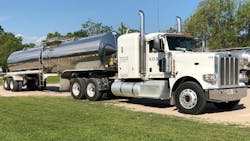Truth or Excuses? Don't settle for a slippery insurance professional
Tank truck carriers hear all kinds of excuses for rate increases during the insurance renewal process. Think about the reasons—aka excuses—you’ve likely heard from brokers attempting to explain increasing premiums.
It’s a “hardening market,” “nuclear verdicts” are the culprit, or new this year: “Blame inflation.”
Sound familiar?
Have you ever wondered about the veracity of these claims? Are they really a cover-up for the broker’s poor handling of your insurance program?
Broken system
There is no question the insurance industry is broken.
The main problem is insurance companies have holes in their bucket. They pour out money on frivolous claims and quick settlements, rather than advocating and protecting the interests of their clients. As a result, insurance companies continually are attempting to add more water to the bucket—in the form of rate increases.
Settlements are more expensive than court verdicts
Research published by the American Transportation Research Institute found crash-related settlements were 37.7% larger than verdicts on average.
Why, then, are carriers so quick to settle?
Insurance companies have the desire to control costs and the plaintiff’s attorneys desire an easier payday. Of course, every situation is unique, but it’s quite common to hear motor carriers say they would rather fight than settle.
It’s about setting a standard. To get paid, you must take the case to court. If this was the norm, the result would be far fewer frivolous claims.
Nuclear verdicts aren’t new
The trucking industry’s first “nuclear” verdict, defined as a judgement in excess of $10 million, was rendered more than 10 years ago, and these types of decisions have only proliferated. Fortunately, emerging technologies and more robust safety practices are helping carriers combat these business-crushing outcomes, but insurance companies should be better suited to handle these cases given how long they’ve been around.
In “Nuclear Verdicts: Defending Justice for All,” Robert F. Tyson, Jr., an attorney well-versed in the defense of large personal injury cases, outlines how defenses can combat tactics of plaintiff’s attorneys and “slay the reptile.” Tyson notes that plaintiff’s attorneys generally are better at honing their craft and sharing tactics than the defense, which often plays it safe, as it’s common for a law firm to work for a particular insurance company on an ongoing basis. Plaintiff’s attorneys, conversely, have one shot with their client—and all their compensation is on the line. Thus, plaintiff’s attorneys often are more creative and apt to take risks.
And the explosion in nuclear verdicts speaks volumes: Plaintiff’s attorneys are winning.
Something must change
Yes, “social inflation” exists, and it has contributed to large verdicts becoming normalized. However, insurance companies need to dig in their heels, stop buying the excuses, and make a change.
This is a call for insurance companies to take more cases to court—and demand a higher level of performance out of their defense attorneys.
Challenges
ATRI’s annual Operational Costs of Trucking report found that insurance-premium costs per mile increased overall by 47% in the last 10 years.
The contributing causes for increasing premiums don’t stop with nuclear verdicts.
For motor carriers—and especially tank truck carriers—there is limited market choice for insurance companies. Only a handful have the appetite and correct coverage endorsements, such as the CA9948 endorsement covering upset, overturn, loading, and unloading. This is coupled with the limited knowledge many insurance professionals have of the tank carrier business.
Because motor carriers must facilitate insurance through a broker or “middleman,” the lack of transparency is an important issue. Often, it’s unclear to the client if they’re being presented to all the available markets. Many times, carriers receive renewals at the last moment, without any transparency leading up to the renewal date, causing them to feel backed into a corner without any workable alternatives.
Most insurance brokers simply act as yearly policy facilitators. It’s not uncommon for carriers to feel their brokers only show up once per year—wearing a suit and driving a Mercedes.
Truthfully, the stereotype isn’t always off the mark.
If a broker comes by more than once per year and sends out certificates in a timely manner, this is viewed as exceptional. But this should be the bare minimum—not a measure of “excellent” service. The real mark of a great broker should be their ability to solve problems and show clients a return on their money spent.
Value-driven approach
Roark and Sutton understands the challenges inherent in a broken system, and isn’t willing to settle for “how things are.” That’s why it’s taking steps to provide real solutions—not excuses.
The firm’s niche is carriers in the tank truck sector. More than 80% of its clients are bulk carriers, and its expertise is in commodities such as petroleum, chemicals, and industrial gasses. The firm built a system that provides a return on insurance dollars invested, and clients receive everything from risk management to proactive claims advancement—all delivered with transparent and frequent communication.
“We started working with Raymond at Roark and Sutton because he is hands-on, responsive, and provided us cost savings,” said Jordan Fojt, owner of Texas-based Ship Our Stuff.
Changing insurance brokers isn’t easy. But if you aren’t realizing the results you deserve, action is imperative. After all, it’s difficult to plead for change in the insurance industry if we’re unwilling to make changes in our own businesses.
Raymond White is a commercial insurance specialist at Roark and Sutton.
About the Author
Raymond White
Commercial insurance specialist
Raymond White is a commercial insurance specialist at Roark and Sutton in Springfield, Missouri.
